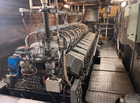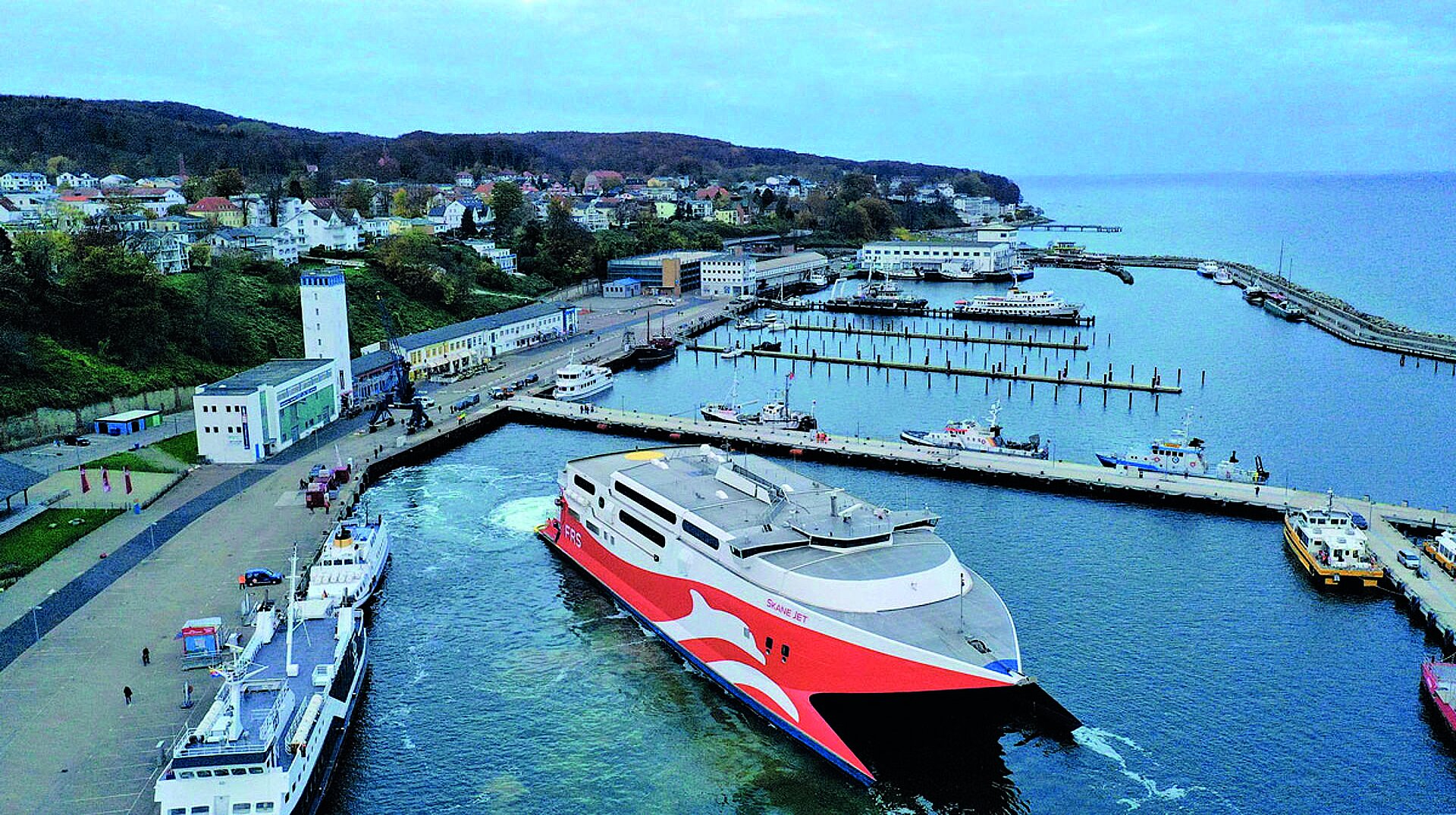
Four powerful diesel engines and four water jet drives make it possible: FRS Baltic GmbH’s "Skane Jet" takes just 2 hours and 15 minutes to travel over 100 km from Sassnitz on Rügen to Ystad, Sweden. There is no faster ferry connection between the two countries! The new season begins in spring 2021. The ship is already good to go, as the winter break was used intensively for maintenance work. This naturally included checking all lubricants with the help of OELCHECK.
Travelling on the Skane Jet is an experience. The catamaran is 91 m long and 26 m wide and races across the Baltic Sea at speeds of up to 35 knots (64.82 km/h). It carries up to 676 passengers and 210 vehicles. To pass the time on board, you can visit restaurants, a shop, learn about the destinations or feel the airstream outside on the open deck.
A classic propeller, commonly referred to as a screw propeller, is nowhere to be seen at the stern of the Skane Jet. It uses the principle of water jet propulsion. Its high speeds are provided by four drive units with jet propulsion. Four impellers (jacketed propellers) suck in water under the hull and blast it out again via jets at the stern. 18.5 m3 of water per second flows through each impeller, whereby the water outlet direction remains constant. But hydraulically controlled sliding reverse flaps, so-called "buckets", redirect the enormous water flow. This means that the water jets are either used for propulsion or deflected in such a way that they push the jet backwards. Standstill is achieved by balancing forward and reverse forces. The impellers are driven via transmissions manufactured specifically by Renk AG for marine applications. They are powered by Ruston 20RK 270M MII four-stroke, high-speed marine diesel engines with a combined power output of 40,000 HP. The pressure ratios on the blades of the impellers are approximately comparable to those of a pump. This means the vibrations are lower than with a conventional propeller ship propulsion, and the ride experience is calmer. However, the jet's hull must be adapted to accommodate the water drive. Vessels with jet propulsion can generally be built particularly flat and are very manoeuvrable, even when travelling slowly

The shipping company only uses marine diesel (MDO) with a sulphur content of less than 0.1 % for the „Skane Jet“. This marine diesel is similar to conventional diesel fuel, but has a higher viscosity and density. It corresponds to the sulphur emission limit value required for operation in EU ports and ECAs (Emission Control Areas). In addition, the marine diesel releases significantly less particulate matter and soot during its combustion process than ship fuels with high proportions of heavy oil and sulphur.
The safety of passengers and crew is of utmost importance at FRS Baltic GmbH. All safety measures comply with the requirements of the international and national safety regulations for seagoing vessels. Employees are expertly trained and the procedures on board and on land are perfectly organized. The maintenance condition of the company’s modern ships is state-of-the-art. Inspection and maintenance measures are continuously carried out. The "Skane Jet" winter break is used to carry out comprehensive maintenance. OELCHECK lubricant analyses are an indispensable component of this. The oils in the engines and their connected transmissions are examined. Not to mention the fluids from the hydraulic systems, which ensure the position of the water outlet jets as well as the capstans, the ship's mooring winches.
The four Ruston four-stroke diesel engines are each filled with approx. 1,200 l of SAE 40 engine oil, which has proven its worth in high-speed marine engines. It is particularly thermally and oxidatively stable and protects against wear, corrosion and deposits. It also has excellent water separation characteristics. When analyzing the oils, OELCHECK examines the oil condition, checks for signs of wear, possible impurities and the condition of the additives. The soot content and any impurities with fuel or water are examined particularly closely. 100 l of a high-performance gear oil (ISO VG 100) with extreme pressure absorption and load-bearing capacity as well as excellent seal compatibility are used to lubricate the gears. However, the transmissions are in service on the high seas. Therefore, when evaluating the oil analyses, OELCHECK tribologists pay particular attention to any water ingress and contamination with sodium, which could originate from the salty seawater.
The speed of the jet is determined by the thrust force of the water jet drives, the direction of travel by the position of the "buckets". Their positioning is facilitated by a hydraulic system filled with a highpressure hydraulic fluid. It protects the hydraulic components and control devices from malfunctions or failures even at low temperatures. When selecting the fluid, the shipping company considered an important property in terms of water pollution control. According to the OECD test and the GHS criteria (Globally Harmonised System), the fluid is neither acutely nor chronically toxic. OELCHECK checks samples from the hydraulic system with regard to wear, purity (filtering) and water content and detects contamination, e.g. from seawater.
The winter break provides an opportunity for comprehensive maintenance of the "Skane Jet" in the town harbour of Sassnitz. However, checks and maintenance work are also carried out continuously throughout the season. The crew monitors all systems and checks compliance with all operating parameters. Lubricant samples from engines, gears and hydraulics are examined every three months by OELCHECK.
Like FRS Baltic GmbH, many shipping companies and operators of port facilities use OELCHECK lubricant analyses. Ships used to construct offshore wind turbines, the Arctic research ship Polarstern or the container terminals in the ports of Hamburg and Rotterdam also have one thing in common: The lubricants in their systems are monitored by OELCHECK lubricant analyses.
FRS Baltic GmbH is a company of FRS GmbH & Co. KG, which looks back on over 150 years of marine history. FRS has evolved from a regional passenger shipping company into an internationally active group of companies and is now one of Europe's leading specialist ferry operators. FRS operates 72 ships and has more than 2,000 employees worldwide. The shipping company has headquarters in Flensburg and operates numerous national and international ferry and catamaran connections, transporting around 7.9 million passengers and 2.1 million vehicles per year. FRS is also active in the areas of offshore logistics, port management, crewing and maritime management consulting.
For further information, visit: www.frs.world
